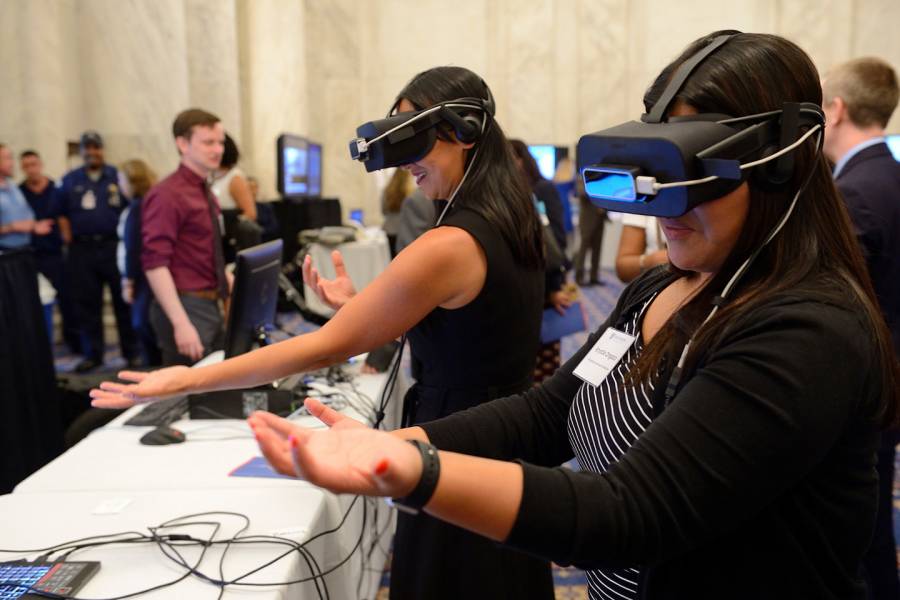Federal funding for research enables technological breakthroughs, the advancement of human welfare, the expansion of human knowledge, and plays a critical role in our country's international competitiveness. But while federal funding for Johns Hopkins University is at a record high, federal funding for all U.S. universities has continued to decline in recent years. In 2017, the overall share of federally funded higher education R&D was the lowest since the national survey began in 1953.
This decline is a threat to national innovation and our international competitive edge.
To underscore the role and subsequent results of federally-funded research, Johns Hopkins will host a showcase of 21 project teams from all corners of the institution at a special event in the House of Representatives. The showcase, called Hopkins on the Hill, takes place Wednesday, June 12, from 5:30 to 7:30 p.m. in the Rayburn Cafeteria of the Rayburn House Office Building in Washington, D.C. The event is free and open to the public, and will include elected officials and their staff members, as well as Johns Hopkins leadership, faculty, staff, students, and alumni. Those interested in attending are encouraged to RSVP online in advance.
"We are thrilled to highlight these early career researchers whose scientific investigations and innovations represent a fraction of the remarkable, publicly funded research underway at Johns Hopkins," says JHU President Ronald J. Daniels. "Their work is not only advancing scientific understanding, but also creating products and therapies that improve the quality of life in America."
Daniels has long been an advocate for the importance of federal support for research, especially for young researchers. Johns Hopkins has led U.S. universities in research and development spending for 39 consecutive years, putting a record $2.562 billion in FY2017 into projects to cure disease, promote human health, advance technology, and expand knowledge of the universe and ourselves.
"The wide breadth of research at Johns Hopkins, from engineering to the life sciences, from the social sciences to the humanities, continues to be funded at record levels," says Denis Wirtz, the university's vice provost for research. "This support allows the institution to uphold its critical mission of fostering independent and original research, and bringing the benefits of discovery to the world."
Nearly 20 federal agencies—including the Army Research Laboratory, National Endowment for the Arts, National Institutes of Health, NASA, and USAID—have provided support for the early stage researchers and their teams who will present at the showcase. These researchers and teams represent all divisions and affiliates of Johns Hopkins University. They are:
- Adam Freeman, Applied Physics Laboratory: "Using Water to Develop Safer Lithium-ion Batteries"
- Neil Fendley, Applied Physics Laboratory: "Adversarial AI—Backdoors in Neural Networks"
- Geoff Osier and Hannah Cowley, Applied Physics Laboratory: "Precision Medicine Analytics Platform—Using AI to Revolutionize Healthcare"
- Parker Solar Probe Team, Applied Physics Laboratory: "Parker Solar Probe—Humanity's First Mission to Our Star"
- Joseph Ali, Berman Institute of Bioethics: "Strengthening the Voice of African Scholars in Global Health Ethics"
- Lauren Tingey, Bloomberg School of Public Health: "Promoting Reproductive Health Equity with Native American Communities"
- Mario Macis, Carey Business School: "Motivating HIV Testing with Incentives and Behavioral Nudges"
- Jemima Frimpong, Carey Business School: "Increasing HIV and Hepatitis C Virus Infection Status Awareness among Individuals with an Opioid Use Disorder"
- Julia Bluestone and Laura Fitzgerald, Jhpiego: "Breaking Training Tradition: Translating Evidence into Effective On-Site, Team-Based Learning"
- Somesh Kumar, Jhpiego: "Using Transformative Solutions to Save Mothers and Newborns"
- Michelle Mendes & Morad Elmi, emocha & Johns Hopkins Technology Ventures: "Using Smartphones to Empower Patients to Take Every Dose of Medication"
- Jacob Lauinger, Krieger School of Arts & Sciences: "Open Access to Threatened Ancient Syrian Records"
- Rebekka Klausen, Krieger School of Arts & Sciences: "Ultrasmall Silicon Fragments"
- Daniel Trahey, Peabody Institute: "Peabody Preparatory Tuned In Wind, Brass and Percussion Congregation"
- David Steinberg, School of Advanced International Studies: "Political Consequences of Foreign-Currency Policy"
- Marcy Davis, School of Education: "Giving High Schoolers a Strong Start by Improving Reading Skills"
- Megan Collins, School of Medicine: "A Vision for Success: How Providing Glasses is Helping Baltimore's Youth"
- Renata Arrington Sanders, School of Medicine: "Providing Unique Support for Health through HIV Prevention and Treatment"
- Laura Samuel, School of Nursing: "Financial Strain Harms Health and Costs Taxpayers Money"
- Claire Hur, Whiting School of Engineering: "Building New Tools to Fight Cancer"
- Victor Nakano, Hopkins Extreme Materials Institute, Whiting School of Engineering: "MEDE: Protecting Soldiers Who Protect Us"
Posted in Science+Technology, University News








